FOREST FLASH
May 2024
In Pacific Forest Trust’s e-newsletter, Forest Flash, we send you the most recent PFT news and updates on forests, clean water, climate, and wildlife. Subscribe here.
PFT Partners with the Southern Sierra Miwuk Nation for Historic Land Return near Yosemite
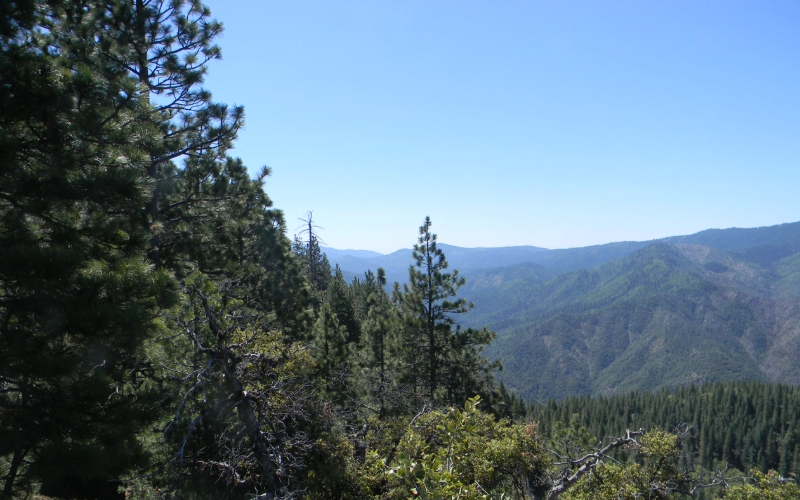
Thanks to a generous grant from the California Natural Resources Agency Tribal Nature-Based Solutions Program, some 900 acres of Yosemite homelands will be returned to the Southern Sierra Miwuk Nation.
The land, which sits atop the Henness Ridge and overlooks both the Yosemite Valley and the Wild and Scenic Merced River, was acquired by PFT to protect it from development and to restore its magnificent forests and meadows. With this grant, we are thrilled to be able to transfer its ownership to the tribe!
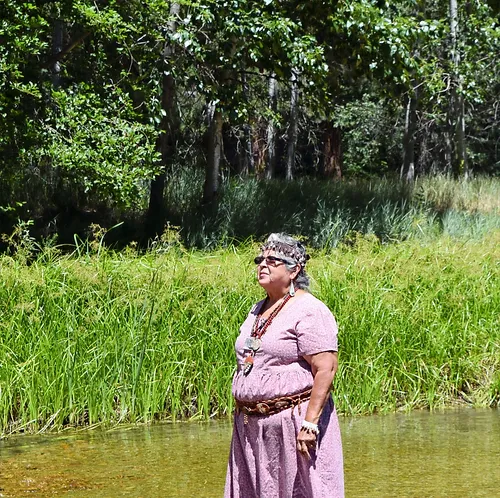
Southern Sierra Miwuk Nation’s Tribal Chairwoman, Sandra Chapman
This land return will not only right a major historical wrong, but also further our work of permanently conserving and stewarding this biodiverse landscape, and connecting its habitats of lush forests, meadows, and springs. “We need to have this significant piece of our ancestral Yosemite land back to bring our community together and benefit our children and grandchildren,” says Southern Sierra Miwuk Nation’s Tribal Council Chair and elder Sandra Chapman. “It will be a sanctuary for our people.”
The Southern Sierra Miwuk’s stewardship will restore and enhance the land’s natural climate resilience using traditional practices, including beneficial fire to this more natural, fire-adapted landscape, cultivating culturally significant plants. PFT will retain a conservation easement on the property supporting that stewardship forever. Amongst the property’s outstanding features are two tributaries that flow into the South Fork Merced River, a traditional trail and migration path for deer and other mammals from the Central Valley to the Sierra highlands and the Valley.
Because of the project’s proximity to world-famous Yosemite National Park, we anticipate this partnership to provide increased visibility of and informational opportunities on the myriad benefits of tribal-led, nature-based solutions, and how they are key in helping California meet its ambitious climate goals. We are grateful to the CNRA and honored to partner with the Southern Sierra Miwuk.
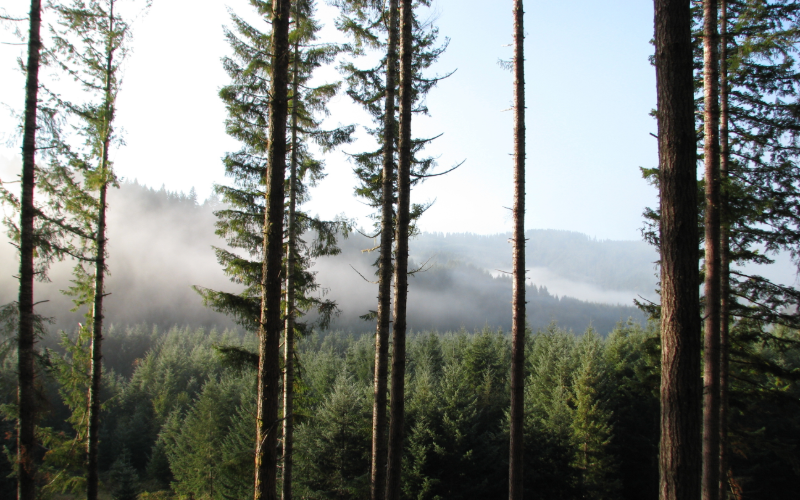
In mid-May, two of PFT’s staff, based out of our office in Ashland, Oregon attended the Oregon Society of American Foresters annual meeting—the first time the Siskiyou Chapter hosted this event in 20 years. This year’s theme was “Forestry’s Changing Landscape: How Do We Meet the Challenge?”. In many general and concurrent technical sessions, we and our colleagues from all corners of the forestry field discussed the shifting social, ecological, and economic landscapes that forestry faces, and how we might embrace these changes in innovative ways.
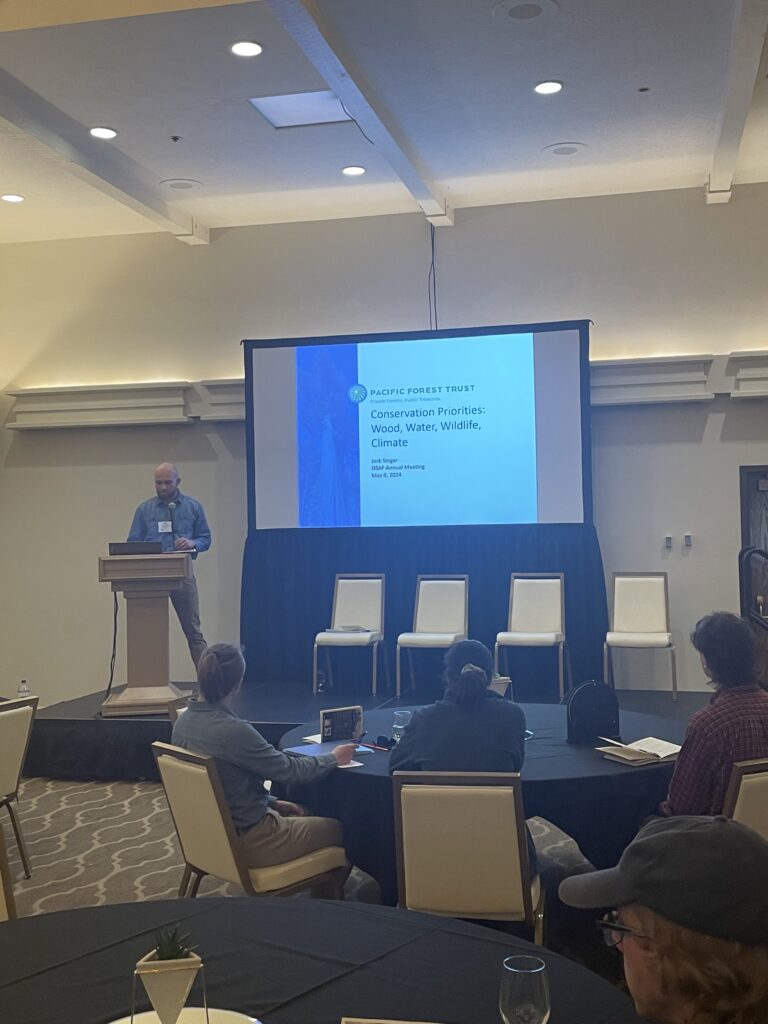
PFT Stewardship Forester Jack Singer presenting.
To that end, PFT’s Stewardship Forester Jack Singer (RPF# 3247), presented on PFT’s unique approach to finding solutions in ecological forest management in the face of climate change. Jack highlighted the myriad benefits of our Working Forest Conservation Easements (WFCEs) model, and how they can provide the wood, water, wildlife, and wonder that we need, while also making it financially feasible for landowners to restore and manage their forests for climate resiliency, and much more. Our van Eck forest project, as well as the Mt. Ashland Demonstration Forest, were used as Oregon-specific examples of how we’ve successfully implemented conservation easements and ecological forest management to this end. The van Eck Oregon forest, part of the coastal temperate rainforest system of the Oregon coast, is being managed to restore and maintain old-growth forest benefits for watershed, habitat, and climate resilience while also producing sustainably harvested wood that benefits Oregon’s jobs and economy. The Mt. Ashland Demonstration Forest, on the other hand, is being managed as a model for how to restore the fire-adapted, diverse forests of the Siskiyou Crest, including their ecologically invaluable wet meadows, all in service of broader climate resilience.
We were delighted to be approached by so many Oregon State forestry students eager to learn more about PFT’s “working forest” model, and how we have supported so many landowners in achieving both their legacies and providing financial support in the process.
Please consider a donation to the Pacific Forest Trust. Your help—in all capacities—makes our work possible. Thanks for supporting us as we support forests!
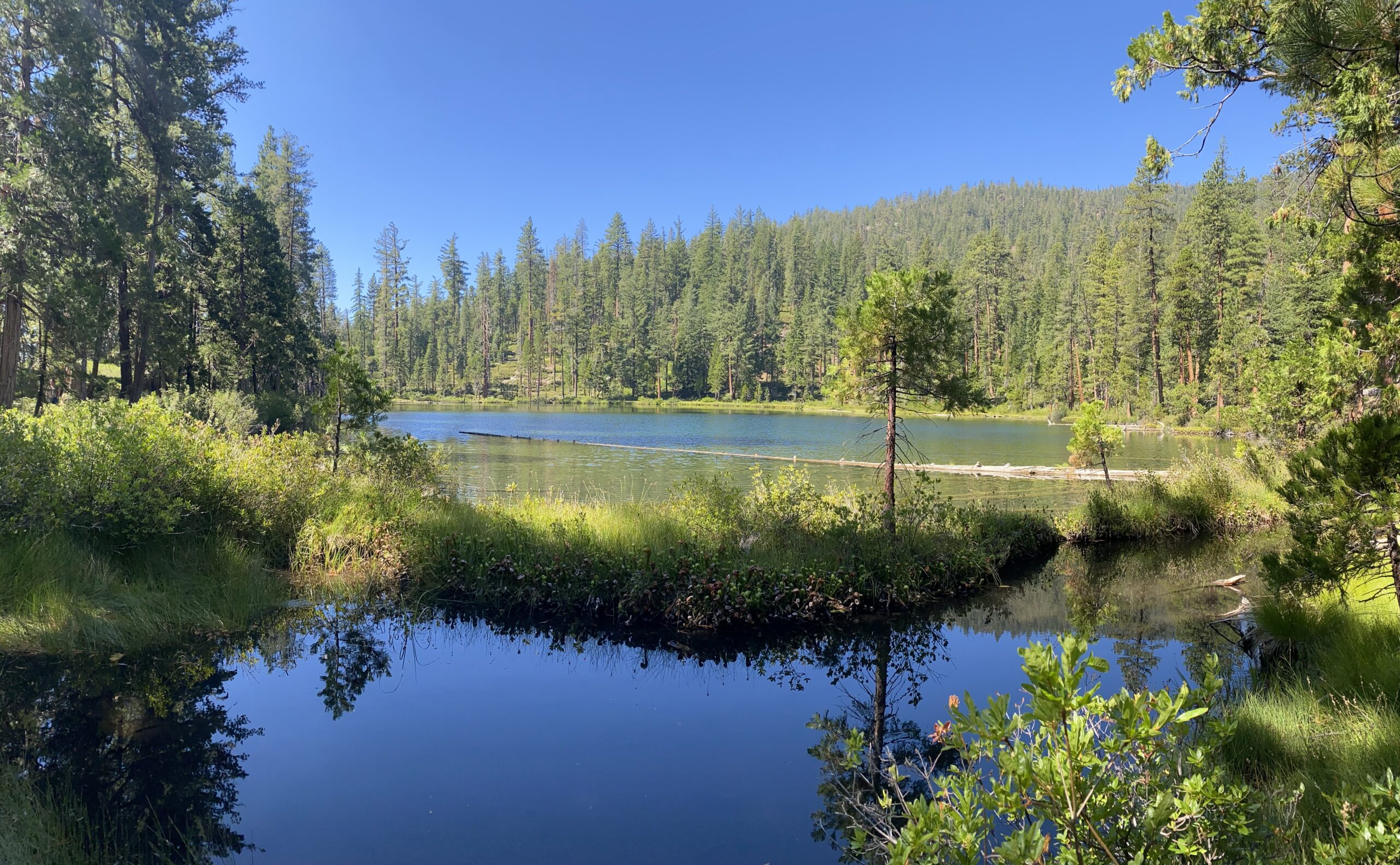
Final funding for the acquisition of the nearly 11,000 acres of our Trinity Headwaters project was just granted on May 23 by California’s Wildlife Conservation Board, thereby ensuring full support for the protection of 10% of the Upper Trinity watershed. This generous grant was the keystone grant for the project, demonstrating the state’s continued commitment to meeting its ambitious 30×30 goals as safeguard its critical water supply at the source. The “30×30” initiative commits the state to protecting 30% of its lands and waters by 2030 to safeguard California’s outstanding native biodiversity. This support complements two other significant grants that PFT gained in 2022 and 2023, respectively: one from the Department of Housing and Urban Development (HUD) Community Development Program (the first of its kind, to our knowledge), as well as one from the Sierra Nevada Conservancy.
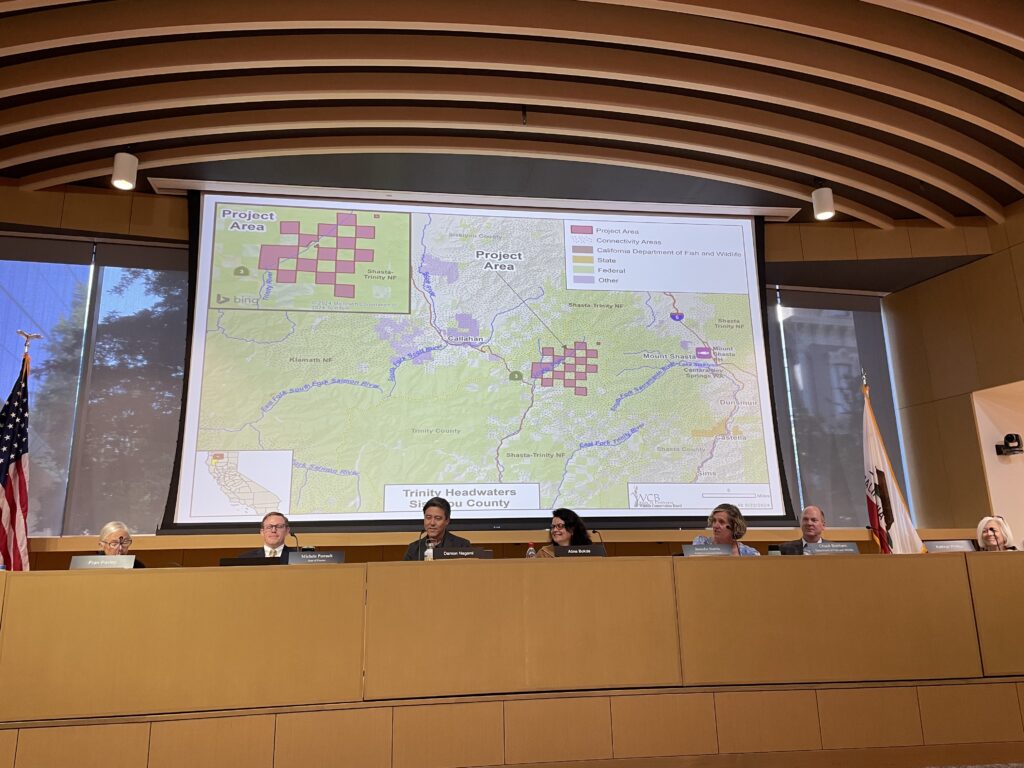
WCB announcing funding for the Trinity Headwaters Project at their May board meeting.
Located where the Klamath Mountains meet the Southern Cascades, Trinity Headwaters is not only the source of the Upper Trinity River, it is home to vast mixed-conifer forests, globally recognized plant biodiversity, rare wet meadows, and at least 242 species. Further, by stitching together a checkerboard ownership with the USFS, the project makes important connections across the watershed and the broader Shasta-Trinity National Forest. With increasing impacts of climate change, many other species are becoming reliant on this region as they migrate up in elevation from the Central Valley and will greatly benefit from the reconnecting of this forest landscape.
Once the acquisition is completed, PFT will transfer ownership of the nearly 11,000-acre property to the Watershed Research and Training Center (WRTC), subject to a conservation easement held by PFT. The easement frames and ensures the WRTC’s careful, active management of the property for climate resilience, wildlife habitats, carbon sequestration, and watershed function supplying water for fish, agriculture, and communities. Of particular note is the WTRC’s goal of providing both employment and education through its restoration management of the property. This will generate employment opportunities in this economically disadvantaged region (Trinity County is the poorest County in California).
We couldn’t be more excited to move this project forward, offering a bold vision for how California can holistically manage landscapes for its biodiversity, water supply, unique ecosystems, climate goals, and economic interests.
ICYMI
In case you missed it (ICYMI), here are some other exciting things PFT has been involved in lately!
- For the Los Angeles Times, and on the occasion of Arbor Day, PFT President Laurie Wayburn penned an op-ed on how conserving and restoring existing forests is far more essential and effective in combating climate change than tree planting alone.
- PFT was also featured on the Engineering with Nature Podcast, discussing forests as crucial natural infrastructure that must be conserved, restored, and maintained for the fight against climate change.
- The Forces for Nature Podcast featured PFT’s work pioneering economic incentives to reward landowners for conserving their forests, as well as our innovative management practices that support climate resilience.
- We had a blast at this year’s Forest Fete, PFT’s annual gala, celebrating the restoration of “good fire,” for all of its benefits. It was lovely to gather forest landowners, policy makers, conservationists, and community leaders under one roof, and to honor distinguished guests making a difference for forests and climate. We ended the night with music by harmonica virtuoso, John Popper. To see photos from Fete, click here.
